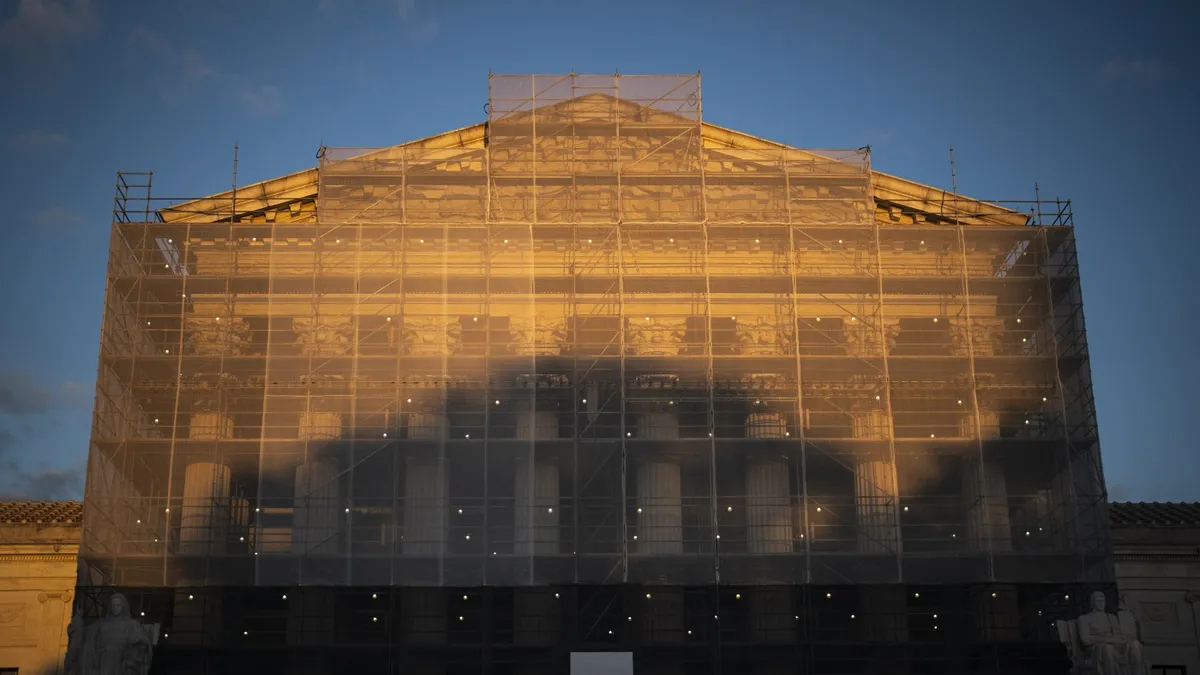
On Wednesday, the Supreme Court is set to hear arguments in a pivotal case that could significantly affect the U.S. economy and the powers of the presidency regarding tariffs. This case stems from an executive order issued by President Trump, which imposed substantial tariffs on foreign imports, marking a controversial chapter in American trade policy.
In April, during a speech in the Rose Garden, President Trump declared what he termed "liberation day," heralding the revival of American industry. Following through on his campaign promise, Trump issued an executive order that established tariffs of at least 10% on goods from various countries, with imports from China facing rates as high as 145%. Meanwhile, goods from allies such as Canada and Mexico were subjected to tariffs of 25%, which later rose to 35% for Canada.
In a recent interview with CBS' 60 Minutes, Trump attributed the success of his negotiations with China to these tariffs, asserting that they were essential in bringing the Chinese to the negotiating table.
However, the fluctuating tariff rates have alarmed American businesses, leading to a court challenge that claims the president has overstepped his authority. Historically, the Supreme Court has supported Trump’s assertions of presidential authority in emergency situations, but this case represents a significant turning point due to its full briefing and expedited arguments. This is the first major opportunity for the justices to oppose presidential power in recent times.
Victor Owen Schwartz, a wine and spirits importer from New York with 40 years of experience, is one of the lead challengers against the tariffs. He emphasizes the misconception that foreign entities bear the brunt of these tariffs, stating, "Americans are paying the taxes." Schwartz highlights that small businesses face not only the burden of rising tariff rates but also a declining dollar value against the euro, resulting in approximately 35% higher costs for his wines, which is unsustainable for his business.
In contrast, President Trump views tariffs as a lucrative opportunity for the federal government, claiming they have generated $195 billion in revenue this fiscal year, as reported by the Committee for a Responsible Federal Budget. Trump has expressed his admiration for tariffs, stating, "Tariffs are going to make us rich as hell." Despite his interest in attending the court hearings, he ultimately opted to send his treasury secretary instead.
The Supreme Court’s ruling against Trump could pose a significant setback for his administration, especially given that it comprises six conservative justices, including three Trump appointees, who may be hesitant to confront the president.
The crux of the case lies in determining whether Trump possesses the authority to unilaterally set tariff rates under the International Emergency Economic Powers Act (IEEPA). Lower courts have ruled against Trump, stating he exceeded his authority under both the statute and the Constitution. Trump, however, argues that both statutes empower him to impose tariffs to address trade imbalances and combat the influx of fentanyl, citing them as national emergencies threatening national security.
Solicitor General D. John Sauer argues that invalidating the tariffs would have catastrophic effects on national security and foreign policy. He claims that the authority to impose tariffs should not be under judicial review but should remain solely in the hands of Congress unless explicitly rejected.
Challenging this perspective, attorney Neal Katyal will argue that the term "tariff" is absent from the IEEPA and that the Constitution grants taxation powers to Congress, not the president. Katyal contends that the notion of previous presidents having such unilateral tariff authority without congressional approval is implausible. He stresses that a different law allows the president to raise tariffs in cases of serious trade deficits, but only for a limited duration.
Katyal's co-counsel, Michael McConnell, emphasizes that the IEEPA is designed for imposing sanctions rather than levying taxes on Americans engaged in lawful trade. Furthermore, challengers argue that the administration’s case fails to meet the major questions doctrine established by the court's conservatives in 2022, which asserts that Congress must explicitly delegate significant policy decisions to another branch of government.
The briefs filed in support of the challengers are overwhelmingly in favor, with 38 briefs representing over a thousand organizations from across the political spectrum, including national security experts and economists. Conversely, only six briefs support the administration's stance, indicating a lack of broad backing for the tariffs.
Despite the challenges ahead, legal experts caution that the court may be reluctant to counter the president’s assertions regarding national security. The determination of what constitutes exigent circumstances often varies, leaving the court in a complex position as it navigates this significant constitutional question.